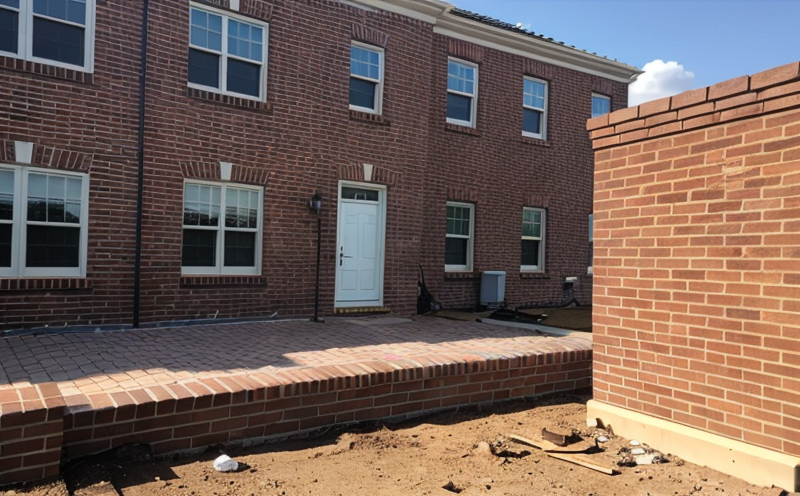ISO 10545 Thermal Expansion of Bricks
The ISO 10545 standard specifies a procedure for determining the linear thermal expansion of bricks. This test is crucial in evaluating how materials behave under varying temperatures, which is essential for ensuring durability and performance in building and infrastructure projects.
Thermal expansion is a fundamental property that affects many construction materials, especially those used in masonry and brickwork. Understanding this behavior helps in designing structures that can withstand temperature fluctuations without compromising on safety or longevity. The test procedure outlined in ISO 10545 involves precise measurement of the change in length of bricks when subjected to controlled heating cycles.
The testing process begins with carefully selecting specimens representative of the batch of bricks being evaluated. These samples are then conditioned under standard environmental conditions before the thermal expansion tests commence. The conditioning step is critical as it ensures that any initial stress or strain within the brick specimens has been minimized, providing more accurate results.
The actual testing process involves placing these conditioned brick specimens into a furnace where they are subjected to gradually increasing temperatures over time. During this heating cycle, precise measurements of the change in length are taken at regular intervals using high-precision instruments such as micrometers or laser interferometers. It is important that these measurements capture even very small changes in dimension since even slight variations can indicate significant differences in material quality.
After reaching a predetermined maximum temperature, the samples are allowed to cool down slowly according to specified cooling schedules. This controlled cooling allows for accurate measurement of the final expansion values which reflect how much each brick specimen expanded due solely to thermal effects during heating.
The results from these tests provide valuable data about the thermal stability characteristics of different types and grades of bricks. Engineers use this information when selecting appropriate materials for specific applications, ensuring that buildings constructed with such bricks will perform well under expected environmental conditions throughout their lifetimes.
Compliance with ISO 10545 standards not only enhances product quality but also supports global trade by providing common benchmarks understood worldwide. By adhering to these internationally recognized guidelines, manufacturers can ensure consistency in their products and meet regulatory requirements across various regions.
International Acceptance and Recognition
The ISO 10545 standard has gained widespread acceptance among countries around the globe due to its robust methodology and universal applicability. Many nations incorporate this standard into their national building codes and regulations, making it a key factor in ensuring compliance with international standards.
Several regions have adopted or referenced ISO 10545 within their local construction regulations, including Europe (EN 992), North America (ASTM C677), and Asia-Pacific countries like China and India. This international recognition underscores the importance of this standard in promoting consistent quality across borders.
Adopting ISO 10545 helps companies demonstrate their commitment to maintaining high standards of product integrity, thereby enhancing customer confidence and fostering trust among stakeholders. Additionally, compliance with these internationally accepted norms can open up opportunities for exporting products internationally while ensuring local projects meet international quality expectations.
Environmental and Sustainability Contributions
- By accurately measuring the thermal expansion properties of bricks, ISO 10545 helps identify materials that are more resistant to temperature changes. This reduces the likelihood of structural damage caused by seasonal variations or sudden temperature shifts.
- The use of precise instruments and controlled environments ensures minimal waste during testing, contributing positively towards reducing operational impacts on the environment.
- Understanding thermal expansion allows architects and engineers to design buildings that are more resilient to environmental stresses, potentially leading to longer-lasting structures with reduced maintenance needs over time.
Competitive Advantage and Market Impact
Implementing ISO 10545 thermal expansion testing provides businesses with several strategic advantages. Firstly, it enhances product quality by ensuring that only high-performance bricks are used in construction projects.
Secondly, adherence to international standards like ISO 10545 can significantly boost a company’s reputation and credibility within the industry. This recognition can translate into increased market share as customers increasingly seek out firms that prioritize stringent testing procedures and quality assurance measures.
A third advantage lies in regulatory compliance, where meeting global standards ensures that products meet or exceed local regulations and codes. This reduces potential legal risks associated with non-compliance issues while also facilitating smoother entry into new markets.
In conclusion, adopting ISO 10545 not only strengthens a company’s position but also contributes positively to the overall sustainability goals of the construction sector by promoting the use of durable and reliable materials.





